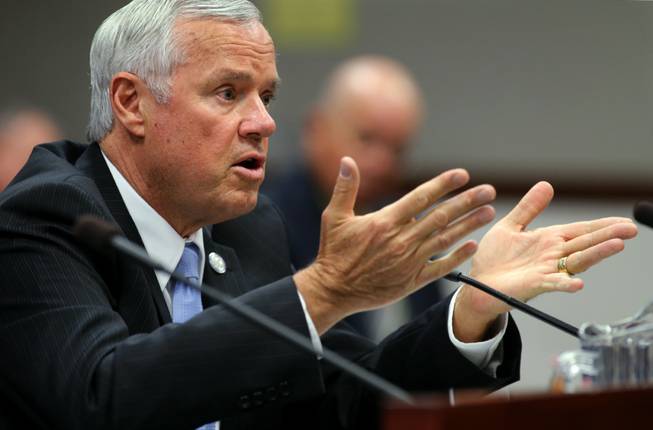
Cathleen Allison / AP
Dan Klaich, chancellor of the Nevada System of Higher Education, testifies at the Legislative Building in Carson City, Tuesday, March 19, 2013.
Friday, March 7, 2014 | 8:30 p.m.
Nevada’s higher education leaders are considering a four-year plan to raise undergraduate student tuition at UNLV by 17 percent.
On Friday, Nevada System of Higher Education Chancellor Dan Klaich urged regents to raise tuition rates for undergraduate and graduate students attending the state’s seven institutions of higher education. Klaich said these tuition increases are necessary to ensure these institutions’ financial sustainability in the aftermath of the economic recession.
At UNLV, Klaich proposed raising tuition by about 4 percent annually for four years, starting in 2015. That means by the 2018-19 academic year, UNLV students will be paying $224 per credit, up from $191.50 per credit today.
Nevada’s 13-member Board of Regents is expected to vote on the proposal in June.
If approved, UNLV’s annual tuition would jump from $5,745 a year in 2013-14 to $6,720 a year by 2018-19. Over the course of four years, a student entering UNLV in 2015 would end up paying more than $1,400 to cover the tuition increase.
Klaich’s proposal has reignited the debate over how UNLV can finance its Tier-1 aspirations while still remaining affordable for many working-class and first-generation college students.
UNLV remains one of the more affordable colleges in the country. Among 16 Western universities, Nevada ranks seventh least expensive, cheaper than public colleges in North and South Dakota.
However, UNLV’s tuition rate has more than doubled in the past decade, from $2,370 a year in 2002 to $5,740 in 2012. The tuition increases have outpaced the rate of inflation, causing more students to graduate in debt. In Nevada, the average college student graduates with nearly $20,000 in loans, which is about $6,000 lower than the national average.
“Access is a pretty critical issue,” Klaich said. “We can talk about being reasonably priced. But for the lowest quartile of students, the cost of education is very high.”
Klaich’s proposal was met with fierce opposition from student leaders, who are concerned about the skyrocketing cost of higher education.
According to a survey of 812 UNLV students, 77 percent opposed the tuition fee increase and 82 percent said it would create a financial hardship that would make it difficult for students to graduate.
UNLV student government President Mark Ciavola blasted regents for raising tuition on students year after year.
“You are making it harder to retain students. You’re crippling students’ ability to graduate,” Ciavola said. “Students are leaving because they’re being priced out. ”
Nevada college students called on university and college administrators to present plans on how they plan to spend and be accountable for the additional revenue from student tuition.
“If you’re going to ask us for more money, we want to see what we’re going to get for it,” UNR business graduate student Andrew Diss said. “We want to see some specifics.”
Students also urged regents to vote on Klaich’s tuition proposal in April — not June, when most students are out of class.
“If you’re going to raise tuition on students, do it to their faces, not over summer break,” Ciavola said.
Regents seemed reserved about Klaich’s tuition hike proposal. Many said they were concerned about raising tuition on students in the aftermath of the economic downturn.
Klaich said if regents approve the tuition increases, they will remain steady for four years unless there was an emergency.
“It would have to be something apocalyptic, an exceptionally extraordinary change to an institution or the state,” Klaich said. “It’s not going to be, ‘I have a new program, I need more cash.’”
Regent Allison Stephens said she isn’t far removed from the experience of paying the high cost of higher education. The UNLV alumna said she transferred to UNLV from University of Southern California because UNLV was cheaper and allowed her the opportunity to get the college experience she was hoping for.
Stephens blamed Nevada lawmakers for not funding higher education adequately, pushing the burden of rising college costs on students. If the Board of Regents approves the tuition hike, Stephens said regents would be complicit in the Legislature’s failure and would be shirking their fiduciary responsibility to protect students’ interests.
“The state has not kept its end of the bargain,” Stephens said. “We need to tell the Legislature to do its job. They’re not doing enough. They’re not doing their part. I am opposed to this.”
After more than an hour of discussion on Friday, regents approved guidelines that allowed colleges and universities to create tuition discount and incentive programs that allow tuition breaks for students in high-need programs or those that graduate on time. Board of Regents Chairman Kevin Paige said he will consider moving up the vote on the tuition increases to April.
Juan Gonzalez said he left the meeting hopeful the regents will listen to students.
The UNLV sophomore business major said he works as a Spanish-language translator and at a fast food restaurant to pay for college. Gonzalez, 21, said he receives some financial help from his one-income family.
“People are struggling to make ends meet,” Gonzalez said. “(The tuition increase) doesn’t sound like a lot to some people, but it’s a lot to me.”

Join the Discussion:
Check this out for a full explanation of our conversion to the LiveFyre commenting system and instructions on how to sign up for an account.
Full comments policy